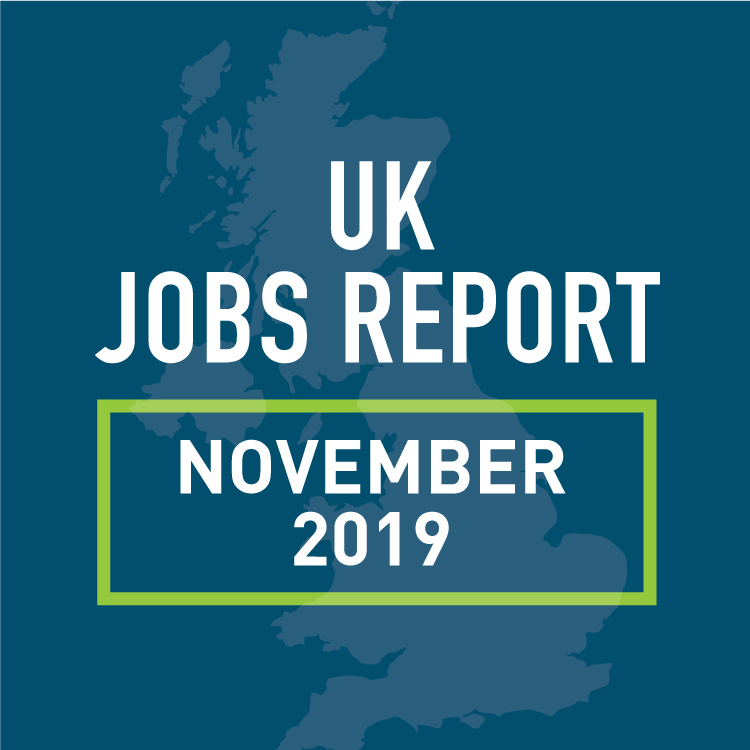The November Labour Market Report released by the Office for National Statistics which includes the quarter covering July through September 2019 reported that 58,000 jobs were lost as the unemployment rate fell to 3.8%. Nominal wages showed an annual increase of 3.6%.

Notable figures from the September report include:
- The UK employment rate was estimated at 76.0%; 0.5 percentage points higher than a year earlier but 0.1 percentage points lower than last quarter.
- Job vacancies which were measured for the period covering August through October showed a decline of 18,000 openings compared to the quarter that ended in July.
- Estimated annual growth in average weekly earnings for employees was 3.6% for both total pay (including bonuses) and regular pay (excluding bonuses). This is a decrease of .02 percentage points from last month’s report.
Job Losses Continued and the Unemployment Rate Fell
In the third quarter of 2019, the economy shed 58,000 jobs, following the decline of 56,000 positions reported last month. The loss was less severe than analysts had predicted—including a Reuters poll of economists which forecasted a median drop of 94,000 jobs. This was the largest drop since the three months ending in May 2015. The number of females in employment dropped by a notable 93,000. Among the reasons that this is a concerning figure is that women have been a driving force in the UK’s job gains in recent years. One important contributor to this decline are the continuing job losses in the retail sector.
Despite the loss of jobs, the unemployment rate fell to 3.8%. This is the lowest level since 1975, which is before the living memory of much of the nation’s workforce. Annual labour market numbers are still strong. There are 323,000 more people working in the UK than a year earlier. The job losses in the quarter were driven by a decrease of 164,000 part-time jobs which was offset by an impressive gain of 106,000 full-time positions.
In Northern Ireland, unemployment fell to a remarkable low of just 2.5%, a level more likely to be found in high-growth Asian nations than in a developed European economy.
Falling Vacancies, EU Nationals Leaving and Slowing Growth
The drop of 18,000 job vacancies from the previous quarter brought the number of decreased vacancies over the last year to 53,000. This is the fifth consecutive annual fall which suggests a trend of diminishing job openings.
Approximately 131,000 EU nationals left work in the UK over the quarter which is the largest decrease since the Office for National Statistics (ONS) began collecting records 21 years ago. This drop outnumbered the additional 125,000 UK nationals who entered employment.
Annual wage increases slowed to 3.6% which is still well ahead of the rate of inflation. However, if the demand for workers continues to fall, wage growth may continue to stagnate as well.
The nation’s economic growth rate is at its slowest in almost a decade, expanding by just 0.3% in the third quarter. This follows a contraction of 0.2% in the second quarter of 2019. Some economists are citing uncertainty over Brexit for the anemic economic figures:
“Tej Parikh, chief economist at the Institute of Directors, said that ‘a return to growth is welcome news, but narrowly avoiding a recession is nothing to celebrate.
The UK economy has been in stop-start mode all year, with growth punctuated by the various Brexit deadlines,’ he added.”
Everything is Possible
UK employers should look beyond the headlines and view this month’s report in context. Unemployment has not been lower in decades and 800,000 job vacancies are waiting to be filled. The result of next month’s election may or may not result in greater clarity concerning Brexit. It is the continuing lack of clarity over the nation’s economic future that should lead employers to actively seek out expertise in talent recruitment and retention. A partner such as a recruitment process outsourcing company can provide a range of solutions resulting in success in an uncertain environment. And as the novelist Dame Margaret Drabble has written, “when nothing is sure, everything is possible.”

![[Webinar] Smart Hiring in the AI Age: What UK Candidates Are Really Doing in 2025](https://www.peoplescout.com/wp-content/uploads/2025/05/AI-enable-applicant-report-320x320.jpg)
